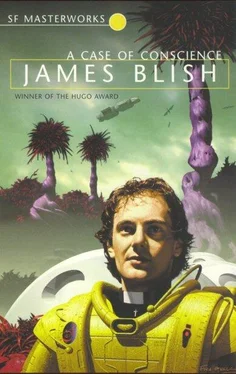The count nodded ruefully. He was watching his meters like a hawk but, judging from his expression, they were not telling him anything he did not already know.
“Ruiz-Sanchez,” the loudspeaker said. Ruiz started.
It was Chtexa’s voice, clear and strong.
Ruiz beckoned at the shadows, and Egtverchi came forward. He was in no hurry. There was something almost insolent in his very walk.
“This is Ruiz-Sanchez, Chtexa,” Ruiz said. “I’m talking to you from Earth—a new experimental communications system one of our scientists has evolved. I need your help.”
“I will be glad to do whatever I can,” Chtexa said. “I was sorry that you did not return with the other Earthman. He was less welcome. He and his friends have razed one of our finest forests near Gleshchtehk Sfath, and built ugly buildings here in the city.”
“I’m sorry, too,” Ruiz-Sanchez said. The words seemed inadequate, but it would be impossible to explain to Chtexa exactly what the situation was—impossible, and illegal. “I still hope to come some day. But I am calling about your son.”
There was a brief pause, during which the speaker emitted a series of muted, anomalous sounds, almost yet not quite recognizable. Evidently the Lithians’ audio hookup was catching some background noise from inside the Tree, or even outside it. The clarity of the reception was astonishing; it was impossible to believe that the Tree was fifty light-years away.
“Egtverchi is an adult now,” Chtexa’s voice said. “He has seen many wonders on your world. Is he with you?”
“Yes,” Ruiz-Sanchez said, beginning to sweat again. “But he does not know your language, Chtexa. I will interpret as best I can.’’
“That is strange,” Chtexa said. “But I will hear his voice. Ask him when he is coming home; he has much to tell us.”
Ruiz put the question.
“I have no home,” Egtverchi said indifferently.
“I can’t just tell him that, Egtverchi. Say something intelligible, in heaven’s name. You owe your existence to Chtexa, you know that.”
“I may visit Lithia some day,” Egtverchi said, his eyes filming. “But I am in no hurry. There is still a great deal to be done on Earth.”
“I hear him,” Chtexa said. “His voice is high; he is not as tall as his inheritance provided, unless he is ill. What does he answer?”
There simply was not time to provide an interpretive translation; Ruiz-Sanchez told him the answer literally, word by word from English into Lithian.
“Ah,” Chtexa said. “Then he has matters of import to his hand. That is good, and is generous of the Earth. He is right not to hurry. Ask him what he is doing.”
“Breeding dissension,” Egtverchi said, with a slight widening of his grin. Ruiz-Sanchez could not translate that literally; the concept was not in the Lithian language. It took him the better part of three long sentences to transmit even a dubious shadow of the idea to Chtexa.
“Then he is ill,” Chtexa said. “You should have told me, Ruiz-Sanchez. You had best send him to us. You cannot treat him adequately there.”
“He is not ill, and he will not go,” Ruiz-Sanchez said carefully. “He is a citizen of Earth and cannot be compelled. This is why I called you. He is a trouble to us, Chtexa. He is doing us hurts. I had hoped you might reason with him; we can do nothing.”
The anomalous sound, a sort of burring metallic whine, rose in the background and fell away again.
“That is not normal or natural,” Chtexa said. “You do not recognize his illness. No more do I, but I am not a physician. You must send him here. I see I was in error in giving him to you. Tell him he is commanded home by the Law of the Whole.”
“I never heard of the Law of the Whole,” Egtverchi said when this was translated for him. “I doubt that there is any such thing. I make up my own laws as I go along. Tell him he is making Lithia sound like a bore, and that if he keeps it up I’ll make a point of never going there at all.”
“Blast it, Egtverchi—” Michelis burst in.
“Hush, Mike, one pilot is enough. Egtverchi, you were willing to co-operate with us up to now; at least, you came here with us. Did you do it just for the pleasure of defying and insulting your father? Chtexa is far wiser than you are; why don’t you stop acting like a child and listen to him?”
“Because I don’t choose to,” Egtverchi said. “And you make me no more willing by wheedling, dear foster father. I didn’t choose to be born a Lithian, and I didn’t choose to be brought to Earth—but now that I’m a free agent I mean to make my own choices, and explain them to nobody if that’s what pleases me.”
“Then why did you come here?”
“There’s no reason why I should explain that, but I will. I came to hear my father’s voice. Now I’ve heard it. I don’t understand what he says, and he makes no better sense in your translation, and that’s all there is to it as far as I am concerned. Bid him farewell for me—I shan’t speak to him again.”
“What does he say?” Chtexa’s voice said.
“That he does not acknowledge the Law of the Whole, and will not come home,” Ruiz-Sanchez told the microphone. The little instrument was slippery with sweat in his palm. “And he says to bid you farewell.”
“Farewell, then,” Ghtexa said. “And farewell to you, too, Ruiz-Sanchez. I am at fault, and this fills me with sorrow; but it is too late. I may not talk to you again, even by means of your marvelous instrument.”
Behind the voice, the strange, half-familiar whine rose to a savage, snarling scream which lasted almost a minute. Ruiz-Sanchez waited until he thought he could be heard over it again.
“Why not, Chtexa?” he said huskily. “The fault is ours as much as it is yours. I am still your friend, and wish you well.”
“And I am your friend, and wish you well,” Chtexa’s voice said. “But we may not talk again. Can you not hear the power saws?”
So that was what that sound was!
“Yes. Yes, I hear them.”
“That is the reason,” Chtexa said. “Your friend Xlevher is cutting down the Message Tree.”
The gloom was thick in the Michelis apartment. As the time drew closer for Egtverchi’s next broadcast, it became increasingly apparent that their analysis of the UN’s essential helplessness had been correct. Egtverchi was not openly triumphant, though he was exposed to that temptation in several newspaper interviews; but he floated some disquieting hints of vast plans which might well be started in motion when he was next on the air. Ruiz-Sanchez had not the least desire to listen to the broadcast, but he had to face the fact that he would be unable to stay away from it. He could not afford to be without any new data that the program might yield. Nothing he had learned had done him any good thus far, but there was always the slim chance that something would turn up.
In the meantime, there was the problem of Cleaver, and his associates. However you looked at it, they were human souls. If Ruiz-Sanchez were to be driven, somehow, to the step that Hadrian VIII had commanded, and it did not fail, more than a set of attractive hallucinations would be lost. It would plunge several hundred human souls into instant death and more than probable damnation; Ruiz-Sanchez did not believe that the hand of God would reach forth to pluck to salvation men who were involved in such a project as Cleaver’s, but he was equally convinced that his should not be the hand to condemn any man to death, let alone to an unshriven death. Ruiz was condemned already—but not yet of murder.
It had been Tannhauser who had been told that his salvation was as unlikely as the blossoming of the pilgrim’s staff in his hand. And Ruiz-Sanchez’ was as unlikely as sanctified murder.
Читать дальше











